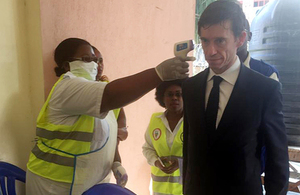Rory Stewart calls for urgent funding on visit to Ebola-hit region in DRC
International Development Secretary calls on other countries to urgently help deal with the ongoing, deadly Ebola outbreak in the Democratic Republic of Congo.

International Development Secretary, Rory Stewart MP, has his temperature checked at an Ebola Virus Disease screening point in the city of Goma, in the Democratic Republic of the Congo, on the border crossing with Rwanda. Picture: DFID/Rhodri Phillips
International Development Secretary Rory Stewart has called on other countries to urgently help deal with the ongoing, deadly Ebola outbreak in the Democratic Republic of Congo (DRC) during a visit to the country.
The outbreak – the world’s second worst ever – has killed over 1,600 people in the North Kivu and Ituri provinces in eastern DRC, since it started in August last year.
During his visit, the Secretary of State talked to Ebola survivors and saw how current patients were receiving treatment in a UK aid funded clinic in Katwa, near the city of Butembo.
He also saw close contacts of Ebola patients receiving a vaccination, which funding from the Department for International Development (DFID) has helped to develop.
More than 150,000 people in the DRC and neighbouring countries have so far received the vaccine during the current outbreak.
The UK and the US are among the biggest donors to the crisis, which is the first major Ebola outbreak to take place in a conflict zone anywhere in the world, with armed groups operating in the region hampering response efforts.
But the International Development Secretary now wants other G7 members to step up to help meet the funding shortfall which the World Health Organization (WHO) and other partners face as they try to contain the disease.
He raised the issue with the development ministers of the G7 countries at a summit in Paris last Thursday (July 4), before flying out to the DRC to see first-hand the devastating impact of the lethal disease.
He called on France, Japan and others to offer more financial support and will continue to push for further funding from other countries in meetings across Europe in the coming weeks.
The Secretary of State said during his visit to Butembo and Katwa on Saturday (July 6):
We are on the edge with this crisis. We keep pulling it back from the brink but it is very dangerous. My visit to eastern DRC has only reinforced my view about just how urgent our response to this crisis must be. This is very, very real.
We are essentially chasing Ebola – one of the world’s most deadly diseases – around an area overrun by armed groups. We are struggling to keep up with it.
DFID has funded the development of a vaccine which is helping to contain this. But one of the major reasons I went to the G7 development ministers meeting in Paris last week was to get other countries, like France, Japan and others to step up and provide more funding.
There is a real danger, that if we lose control of this outbreak, it could spread beyond DRC’s borders to the wider region and the wider world. Diseases like Ebola have no respect for borders and are a threat to us all.
This has to be dealt with. We have to grip this. If we don’t we are facing not just needless horrifying suffering here in DRC, but also the possibility of this disease spreading further afield.
It was the Secretary of State’s first visit to Africa since becoming International Development Secretary in May, and the first visit to DRC by a Cabinet Minister since William Hague visited as Foreign Secretary in 2013.
On Friday (July 5), the International Development Secretary visited Goma, a city in DRC, which borders Rwanda.
No Ebola cases have appeared so far in Goma during the current outbreak and preventative measures funded by UK aid are in place to try to stop it from spreading there.
The Secretary of State saw how the International Organization for Migration is working with the government of the DRC to improve screening at the border.
This includes taking the temperature of everyone who crosses the border using an infrared device held up to the forehead.
As well as helping to develop the Ebola vaccine, the UK has provided funding to partners on the ground including the WHO, UNICEF and the International Federation of Red Cross (IRFC) and Red Crescent Societies.
The UK is also the largest donor when it comes to helping neighbouring countries better prepare for potential spread outside the DRC. This includes through the vaccination and training of health workers, as well as raising awareness of the disease and its effects.
It has also deployed experts from the UK Public Health Rapid Support Team to the DRC.
Notes to editors
- The Government of DRC has requested that donors do not announce specific funding figures to avoid putting first-line responders at further risk of attack.
- The UK is calling for a new, stronger approach to responding to the Ebola outbreak, including tackling the mistrust of communities, which have suffered decades of conflict, and in some cases do not believe Ebola is real.
- The DRC outbreak is second in scale only to the West Africa outbreak of 2013 to 2016.
- Public Health England considers the risk to the UK to be very low/negligible.
ENDS
General media queries (24 hours)
Email mediateam@dfid.gov.uk
Telephone 020 7023 0600
If you have an urgent media query, please email the DFID Media Team on mediateam@dfid.gov.uk in the first instance and we will respond as soon as possible.